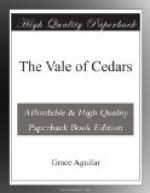Not a word was spoken; not a moment did the fiery chargers halt in their headlong way. On, on they went; on, over wide moors and craggy steeps; on, through the rushing torrent and the precipitous glen; on, through the forest and the plain, with the same unwavering pace. Repeatedly did Marie’s brain reel, and her heart grow sick, and her limbs lose all power either to guide or feel; but she neither spoke nor flagged—convulsively she grasped the reins, and closed her eyes, as the voice and hand of her companion urged their steeds swifter and yet swifter on.
An exclamation from Perez roused her. The turrets of Segovia were visible in the distance, glittering in the brilliant sun; but her blood-shot eye turned with sickening earnestness more towards the latter object than the former. It had not yet attained its full meridian—a quarter of an hour, perhaps twenty minutes, was still before them. But the strength of their horses was flagging, foam covered their glossy hides, their nostrils were distended, they breathed hard, and frequently snorted—the short, quick, sound of coming powerlessness. Their steady pace wavered, their heads drooped; but, still urged on by Perez’s encouraging voice, they exerted themselves to the utmost—at times darting several paces suddenly forward, then stumbling heavily on. The cold dew stood on Marie’s brow, and every pulse seemed stilled. They passed the outer gates—they stood on the brow of a hill commanding a view of the whole city. The castle seemed but a stone’s throw from, them; but the sound of muffled drums and other martial instruments were borne towards them on the air. Multitudes were thronging in one direction; the Calle Soledad seemed one mass of human heads, save where the scaffold raised its frightful sign above them. Soldiers were advancing, forming a thin, glittering line through the crowds. In their centre stood the prisoner. On, again, dashed the chargers—scarcely a hundred yards separated them from the palace-gate. Wildly Marie glanced back once more—there were figures on the scaffold. And at that moment—borne in the stillness more loudly, more heavily than usual, or, at least, so it seemed to her tortured senses—the huge bell of the castle chimed the hour of noon!
CHAPTER XXVI.
“The outmost crowd have heard a
sound,
Like horse’s hoof on harden’d
ground;
Nearer it came, and yet more near—
The very deathsmen pause to hear!”
SIR WALTER SCOTT.
In his private closet, far removed from the excitement stirring without, King Ferdinand was sitting, on the morning appointed for Stanley’s execution: several maps and plans were before him, over which he appeared intently engaged; but every now and then his brow rested on his hand, and his eyes wandered from their object; Isabella was at work in a recess of the window near him, conversing on his warlike plans, and entering warmly into all his measures, as




